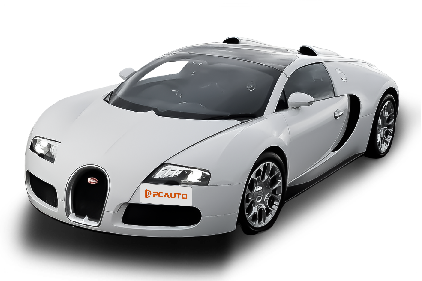Q
How many radiators is the Bugatti Veyron equipped with?
The Bugatti Veyron, as a top-tier supercar, features an incredibly complex cooling system with no fewer than 10 radiators. These are crucial to keeping its monstrous W16 engine and high-performance components running reliably even under extreme conditions. We're talking about the main engine radiator, intercoolers, transmission cooler, differential cooler, and even the A/C condenser—each one pulling double duty to keep specific systems frosty.
Now, this detail matters a lot to Malaysian car enthusiasts. Let's face it, our hot and humid climate is brutal on a car's cooling capabilities. The Veyron's multi-radiator setup? It's basically engineered to laugh in the face of that heat, ensuring you don't lose a single pony when the mercury spikes.
Sure, all these radiators add some heft and complexity, but that's pretty standard fare for high-performance exotics. Brands like Lamborghini and Koenigsegg do similar things—they prioritize keeping that powerplant happy during hard driving over shaving off a few kilos. And hey, if you're lucky enough to own or even maintain one, keep those radiators clean! A buildup of dust or debris can seriously cramp their cooling style, and you don't want that.
Special Disclaimer: This content is published by users and does not represent the views or position of PCauto.
Related Q&A
Q
How long does it take to empty the tank on a Bugatti Veyron?
As a high - performance supercar, the Bugatti Veyron has a fuel tank capacity of approximately 100 liters. It has extremely high fuel consumption when driven at top speed. According to official data, when traveling at a top speed of 407 kilometers per hour, the fuel tank will run out in about 12 minutes. In daily driving conditions, the fuel consumption will be relatively lower, and the specific time depends on the driving style and road conditions.
For car enthusiasts in Malaysia, it should be noted that this kind of supercar is not designed to save fuel but to pursue ultimate performance. Therefore, in the local hot climate and congested traffic conditions, the actual fuel consumption may be even higher.
The Veyron is equipped with an 8.0 - liter quad - turbocharged W16 engine that can output over 1000 horsepower. This kind of power configuration brings an amazing acceleration experience but also means higher fuel consumption.
It is recommended that Malaysian owners, when using this kind of supercar, not only pay attention to fuel economy but also focus on regular maintenance. In particular, they should check the cooling system and lubrication system under high - temperature conditions to ensure that the vehicle is always in the best condition.
Q
Is the Bugatti Veyron faster than the Bugatti Chiron?
Both the Bugatti Veyron and the Bugatti Chiron are legendary models in the super - car world, but the Chiron truly outperforms the Veyron in terms of performance. When the Veyron was launched in 2005, it shocked the world with a top speed of 431 km/h. As its successor, the Chiron, after its release in 2016, further increased the top speed to 420 km/h (the electronically limited version). However, the unrestricted Chiron Super Sport 300+ set a production - car top - speed record of 490.48 km/h in 2019, far exceeding that of the Veyron.
Both cars are equipped with an 8.0 - liter quad - turbocharged W16 engine. Nevertheless, the Chiron's engine has been optimized, with the maximum horsepower increasing from 1001 hp of the Veyron to 1500 hp (in the Chiron Super Sport version). At the same time, the aerodynamics and chassis technology have been improved, resulting in better acceleration and handling.
For car enthusiasts in Malaysia, although these two models are rare locally, their engineering represents the pinnacle of the automotive industry and showcases Bugatti's pursuit of ultimate performance. It's worth noting that the performance of a super - car depends not only on its top speed but also on acceleration, cornering performance, and daily driving experience. The Chiron has been comprehensively upgraded in these aspects, making it more suitable for the needs of modern super - car users.
Q
How long do Bugatti Veyron tires last at top speed?
The tire life of the Bugatti Veyron at top speed is approximately 15 minutes. This is because when the vehicle is traveling at a maximum speed exceeding 400 km/h, the tires are subjected to extreme centrifugal forces and high temperatures, causing the rubber to wear out rapidly. Although the Michelin PAX tires specially designed for the Veyron use high - strength materials and a special structure to handle extreme conditions, rapid wear at top speed is still unavoidable. Therefore, Bugatti officially advises owners to avoid maintaining top - speed driving for long periods to extend tire life and ensure safety.
For owners in Malaysia, although local road conditions cannot meet the Veyron's top - speed requirements, understanding this helps in better maintaining the supercar's tires. During daily driving, attention should be paid to tire maintenance. For example, regularly check tire pressure and wear, and avoid aggressive driving. Additionally, Malaysia's hot climate may also accelerate tire aging, so it is recommended to park the vehicle in a shady place and use appropriate tire protectants.
Q
Why is the Bugatti Veyron so popular?
The reason why the Bugatti Veyron is so popular is mainly due to its status as the benchmark for supercars in the early 21st century. Its 8.0-liter W16 quad-turbocharged engine can output 1,001 horsepower, and its top speed exceeds 407 km/h, making it the fastest production car in the world at that time. This extreme performance has attracted countless car enthusiasts. For Malaysian car enthusiasts, the Veyron is not just a speed machine but also a symbol of engineering art. Its carbon fiber body, active aerodynamic design, and precise hand - made manufacturing process showcase the pinnacle of the automotive industry. The success of the Veyron has also promoted the development of subsequent models such as the Chiron, further consolidating Bugatti's position in the super - car field. It is worth mentioning that although the hot and rainy climate in Malaysia poses challenges to the maintenance of high - performance cars, top - notch supercars like the Veyron are still regarded as treasures by local collectors. Whenever it occasionally makes an appearance at high - end car gatherings in Kuala Lumpur or Penang, it always causes a sensation. Its rarity (only 450 units were produced globally) and legendary status also make it an important symbol in automotive culture.
Q
How much is a Bugatti Veyron full tank?
The Bugatti Veyron has a fuel tank capacity of 100 liters. Based on the current price of RON 97 gasoline in Malaysia (around 3.50 ringgit per liter), it would cost approximately 350 ringgit to fill up the tank. However, as a top - tier supercar, the Veyron usually recommends using higher - grade fuel to ensure its performance, so the actual cost might be slightly higher. The car is equipped with an 8.0 - liter W16 quad - turbocharged engine. While it offers astonishing power, it also has relatively high fuel consumption. In urban driving, the fuel consumption per 100 kilometers could exceed 30 liters, so frequent refueling is the norm.
For car enthusiasts in Malaysia, apart from the fuel cost, they also need to consider the maintenance and insurance costs of such supercars, which are significantly higher than those of ordinary vehicles. Additionally, the hot and humid climate in Malaysia poses a challenge to the cooling system of high - performance engines, making regular maintenance especially crucial.
As a limited - production top - tier supercar, the Bugatti Veyron is rarely seen on Malaysian roads. Its rarity also makes it highly sought after in the collector's market.
Q
What car replaced the Bugatti Veyron?
The successor to the Bugatti Veyron is the Bugatti Chiron. This super - car was officially launched in 2016, inheriting the legendary status of the Veyron and achieving a full - scale upgrade in performance and technology. The Chiron is equipped with an 8.0 - liter quad - turbocharged W16 engine with a maximum power of 1500 horsepower. Its top speed is electronically limited to 420 km/h, and it can accelerate from 0 to 100 km/h in just 2.5 seconds, demonstrating Bugatti's top - notch technological strength in the super - car field. For car enthusiasts in Malaysia, although this kind of super - car is quite rare locally, they still have a chance to appreciate it up close through official dealers or international auto shows. The Chiron not only continues the extreme performance of the Veyron but also incorporates more modern technology and luxury design, such as more advanced aerodynamic kits and customized services, further consolidating Bugatti's leading position in the super - car market. It's worth mentioning that Bugatti has also launched several special - edition models based on the Chiron, such as the Chiron Super Sport 300+ and the Chiron Pur Sport, to meet the needs of different collectors.
Q
How many Bugatti Veyron are there in the world?
The Bugatti Veyron is a globally limited-production supercar. According to official data, from 2005 to 2015, including the regular version, the Grand Sport convertible version, the Super Sport high-performance version, and specially customized versions, a total of about 450 units were produced. Among them, the Super Sport version once set a world record for production cars with a top speed of 431 kilometers per hour, demonstrating Bugatti's ultimate pursuit of engineering and performance.
For car enthusiasts in Malaysia, although the Veyron is extremely rare locally, the Bugatti brand has gradually expanded its influence in the Southeast Asian market through official channels in recent years. For example, it has set up a showroom in Singapore. Maybe there will be more opportunities to see Bugatti models in Malaysia in the future.
As a milestone in Bugatti's modern revival, the Veyron is not only equipped with an 8.0-liter quad-turbocharged W16 engine. Its unique aerodynamic design and luxurious handcrafting also make it a rarity in the eyes of collectors. Subsequent models such as the Chiron and Divo have also carried on the technical essence of the Veyron, further consolidating Bugatti's top position in the supercar field.
Q
How much is a Bugatti Veyron oil change?
The cost of changing the oil for a Bugatti Veyron varies depending on the region and the service center. However, based on global data, the cost of a single oil change usually ranges from RM 20,000 to RM 25,000. This is mainly due to the fact that its 8.0-liter W16 engine requires high-performance oil and a complex maintenance process. Additionally, the Veyron has a large oil capacity (around 15 liters) and needs high-spec synthetic oil specifically designed for supercars, which further drives up the cost.
For Malaysian owners, since there is no official Bugatti service center in the country, they may need to transport their vehicles to neighboring countries such as Singapore or Thailand for maintenance. This will incur additional transportation and tariff costs. It's worth noting that the regular maintenance of a supercar doesn't just involve changing the oil. It also includes checking key components such as the turbocharging system, suspension, and brakes to ensure the vehicle is always in top condition. Therefore, it is recommended that owners set aside a sufficient budget to cover the comprehensive maintenance expenses.
If you're thinking about owning a top - tier supercar like the Veyron in the long term, it's very important to understand its maintenance cycle (usually every 10,000 kilometers or once a year) and the overall maintenance cost. This way, you can avoid affecting the vehicle's performance and resale value due to negligence.
Q
Is the Bugatti Veyron a luxury car?
The Bugatti Veyron is truly a luxury car. It is not only renowned for its outstanding performance but also has become an iconic product in the automotive world due to its exquisite craftsmanship and luxurious design. As a supercar, the Veyron is equipped with an 8.0 - liter quad - turbocharged W16 engine and can reach a top speed of 407 kilometers per hour. This kind of performance has earned it a special place in the hearts of car enthusiasts in Malaysia and around the world. Although its price is extremely high, it also reflects its rarity and top - notch manufacturing standards. In Malaysia, due to taxes and import restrictions, the Veyron is even rarer. Therefore, owning it is not only a symbol of wealth but also a pursuit of the ultimate in automotive craftsmanship. It's worth mentioning that the interior of the Veyron uses top - grade materials such as genuine leather and aluminum alloy. Every detail has been meticulously crafted to ensure that drivers and passengers enjoy an unparalleled experience of comfort and luxury. For Malaysian car fans, the Veyron is not just a car; it is a combination of engineering and art, representing the pinnacle of the automotive industry.
Q
Why was the Bugatti Veyron discontinued?
The discontinuation of the Bugatti Veyron is mainly because its product life cycle is nearing the end. Meanwhile, Bugatti aims to concentrate its resources on the R & D of new - generation supercars, such as the subsequently launched Chiron. This car has seen significant improvements in performance and technology, and the Veyron has fulfilled its mission as the brand's flagship.
Since its launch in 2005, the Veyron has become a milestone in the automotive industry with its astonishing 1001 horsepower and a top speed of over 400 km/h. However, with the development of technology and the increasingly strict environmental regulations, Bugatti needs to introduce more advanced and efficient models to meet market demands.
For Malaysian car enthusiasts, although the Veyron is extremely rare in the local area, it represents the pinnacle of super - car technology. Subsequent models like the Chiron continue this legend, and Bugatti also consolidates its leading position in the super - car field by constantly pushing the engineering limits.
The discontinuation of the Veyron is not due to problems with the brand or the model. Instead, it is a common product iteration strategy in the automotive industry to ensure the brand's continuous innovation and competitiveness.
Popular Cars
Model Year
Car Compare
Car Photo
Latest Q&A
Q
How much does it cost to refill a hydrogen fuel cell car?
The hydrogen refueling cost for hydrogen fuel cell vehicles is currently approximately 45 to 80 Malaysian Ringgit per kilogram, with the specific price influenced by hydrogen production methods, transportation, and hydrogen refueling station operation costs. Taking the Haima 7X-H as an example, its 70MPa high-pressure hydrogen storage tank can be fully refueled in 3 to 5 minutes, offering a range of 800 kilometers and a hydrogen consumption of 0.87 kilograms per 100 kilometers. Based on the current preferential price of 16 Malaysian Ringgit per kilogram, the cost per kilometer is less than 0.2 Malaysian Ringgit. Compared with pure electric vehicles, hydrogen fuel cell vehicles have advantages in refueling speed and low-temperature performance, but the hydrogen production cost remains relatively high at this stage. For instance, the cost of hydrogen production via water electrolysis is about 30-40 Malaysian Ringgit per kilogram, and after accounting for transportation and hydrogen refueling station allocation costs, the terminal selling price may reach 50-80 Malaysian Ringgit per kilogram. With technological advancements and large-scale production, the stack cost is projected to decrease from the current 2000-3000 Malaysian Ringgit per kilowatt to below 1000 Malaysian Ringgit by 2030, while the hydrogen price is also expected to drop to 30 Malaysian Ringgit per kilogram. By then, the per-kilometer operating cost may approach that of conventional fuel vehicles. Currently, government subsidies play a crucial role in alleviating user costs. For example, some demonstration projects maintain hydrogen refueling prices at 25-35 Malaysian Ringgit per kilogram.
Q
How much does a fuel cell cost?
Fuel cell vehicles currently have a significantly higher cost in the Malaysian market than traditional fuel vehicles and lithium-ion battery electric vehicles, mainly due to the costs of fuel cell systems, hydrogen storage devices, and hydrogen supply. Taking fuel cell buses as an example, their selling price is about 2 million to 3 million ringgit, approximately 1.4 million ringgit higher than that of traditional diesel models; the cost increase for 7.5-ton logistics vehicles is about 640,000 ringgit. The core costs come from the fuel cell system (about 18,000 ringgit per kilowatt) and high-pressure hydrogen storage tanks (30,000 ringgit each), while the price of hydrogen is about 45 ringgit per kilogram, and the high investment cost of hydrogen refueling stations also drives up usage costs. Although government subsidies can temporarily narrow the purchase price gap with fuel vehicles, long-term cost competitiveness still depends on technological breakthroughs and large-scale production. Currently, fuel cell vehicles have not been commercialized on a large scale in Malaysia, but in the future, with local technology research and development (such as the electrification initiatives of Perodua and Proton) and the improvement of hydrogen energy infrastructure, costs are expected to gradually decrease. It should be noted that at this stage, promoting fuel cell vehicle models still requires overcoming challenges such as an insufficient hydrogen refueling network and user acceptance.
Q
How do you fuel a fuel cell vehicle?
The refueling process of fuel cell vehicles is similar to that of gasoline-powered vehicles, but specific safety regulations must be followed. First, a hydrogen refueling station should be located via a navigation system or online map. Currently, the global hydrogen refueling station network is expanding rapidly, and as of 2023, facilities in the Asian region account for over 60%. Upon arrival, the vehicle should be parked in the designated area with all power systems turned off. Certified operators will use specialized equipment to complete preparatory procedures, including hydrogen refueling port integrity checks and anti-static grounding. During refueling, the hydrogen dispenser must be securely connected to the hydrogen storage tank interface. A 70MPa high-pressure hydrogen storage system typically completes refueling within 3-5 minutes, providing the vehicle with a range of approximately 245 kilometers. The use of open flames or electronic devices is strictly prohibited throughout the process, and hydrogen refueling stations are equipped with multiple safety interlock systems to ensure operational safety. Notably, the newly commissioned hydrogen-powered smart rail transit vehicles employ intelligent hydrogen storage systems, and their refueling procedures differ from those of conventional passenger cars. Specific operations must strictly adhere to the manufacturer's guidelines. With the ongoing development of hydrogen infrastructure, refueling convenience is expected to improve significantly in the future. However, at this stage, drivers are advised to plan their routes in advance and verify the operational status of hydrogen refueling stations.
Q
What is the mileage in a 1 kg hydrogen car?
The actual driving range of hydrogen fuel cell vehicles is closely related to the vehicle model, technical route, and operating conditions. Taking the second-generation Toyota Mirai as an example, under WLTC conditions, each kilogram of hydrogen can support a range of approximately 150 kilometers (calculated based on 5.6kg of hydrogen for 850km), while under extreme test conditions, it has achieved an energy efficiency of 240 kilometers per kilogram of hydrogen. In daily driving, mainstream hydrogen fuel cell passenger vehicles typically achieve 100 to 125 kilometers per kilogram of hydrogen, though this may decrease to around 80 kilometers under urban congestion due to road conditions and driving habits. In contrast, hydrogen internal combustion engine models, owing to their lower energy conversion efficiency, can only travel 30 to 50 kilometers per kilogram of hydrogen. In the commercial vehicle sector, load requirements typically result in hydrogen consumption of 4 to 6 kilograms per 100 kilometers, equating to only 16 to 25 kilometers per kilogram of hydrogen. Notably, hydrogen storage technology (such as 70MPa high-pressure gaseous hydrogen storage) and ambient temperature (low temperatures may reduce fuel cell efficiency by 10% to 15%) also significantly impact the actual range. The Mirai model adopted by the Sarawak state government has demonstrated the feasibility of hydrogen fuel technology in local applications, with its 3-minute refueling time and zero-emission characteristics offering valuable insights for future transportation energy transitions.
Q
Do fuel cell cars need gas?
Fuel cell vehicles do not require traditional gasoline as fuel. Their power system generates electricity through the electrochemical reaction between hydrogen and oxygen in the fuel cell to drive the vehicle. Hydrogen storage methods include compressed gas, liquid hydrogen, or metal hydride hydrogen storage. The energy conversion efficiency of such vehicles is as high as 60%-80%, significantly higher than that of internal combustion engines, and their only emission is water, making them a zero-pollution technology. Currently, commercial applications still face challenges such as hydrogen storage technology and hydrogen refueling station infrastructure. However, hydrogen fuel can be produced from renewable energy sources, giving it an advantage in energy sustainability. It should be noted that some dual-fuel models may be equipped with both hydrogen fuel and other energy systems, but mainstream fuel cell vehicles rely entirely on hydrogen for power, which is fundamentally different from traditional fuel-powered vehicles.
View More

















Pros
Cons